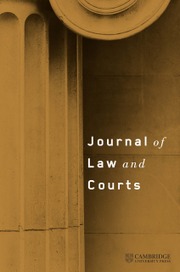Welcome to the very first issue of the Journal of Law and Courts. Here and in all the issues to follow, we hope you will find article after article that broadens your knowledge, deepens your understanding, and raises exciting new questions as to law and legal actors across a vast geographic, temporal, and theoretical range.
JLC aims to publish articles that are simultaneously of very high quality and great substantive interest, with the goal of helping to combat intellectual isolation and fragmentation. At a time when most of us too often read and write for scholars whose work looks like our own and find ourselves unable to keep up with the ideas and findings of scholars who share important concerns with us but come at them from different perspectives, it is essential that we have a single forum where readers know they can find articles that range across the entire intellectual spectrum of law and courts scholarship and where authors understand that they have a responsibility to write articles that people outside their circle will want to read. JLC intends to be that forum.
Every journal must make decisions of emphasis. We might think of the ideal article as a flawlessly conceived and executed, beautifully written study of an issue of major substantive importance that causes us to look at the world differently. But very few such articles exist in the real world. When almost all scholarship necessarily has important limitations, how much weight should be given to different desiderata?
It is our sense that many peer-reviewed journals today place the most weight on execution and clarity of results (in empirical findings or argument). This undoubtedly promotes scholarly rigor across the board. Still, if too many journals give primary emphasis to execution and results, then substantive importance and originality in theory, argument, and research design can end up being devalued, with unhealthy consequences for scholarship. With this view in mind, our intention is to have JLC lean slightly in the other direction. Even the most impressively executed study will not find a home in JLC if we do not feel confident that it would be regarded as substantively important and original by a large number of readers. On the other hand, if we believe that a well-executed paper raises important issues and addresses them creatively and persuasively, we will be inclined to publish it even in the face of reasonable disagreements about its conclusions, in the expectation that scholars who have doubts will be stimulated to do work in response and that the end result will be greater and more secure knowledge and understanding.
Whatever your discipline and your approach to the study of law and courts, we hope that you agree with these aims and, even if not, that you find reading JLC a rewarding experience. We also hope that you will contribute to JLC’s success by serving as a referee and submitting your own best work for publication.
Happy reading,
David Klein
Brandon Bartels
Pamela Brandwein
Keith Bybee
Javier Couso
Charles Epp
Leslie Goldstein
Stacia Haynie
Ran Hirschl
Jeffrey Lax
Lynn Mather
Julie Novkov
Suzanna Sherry
Georg Vanberg


